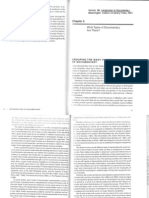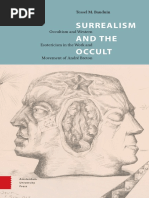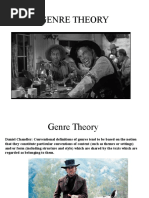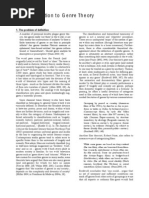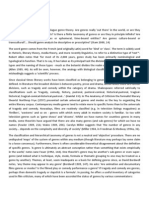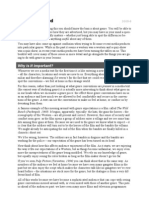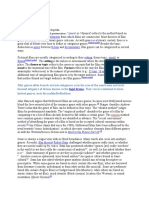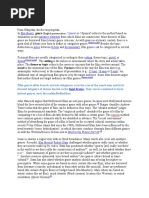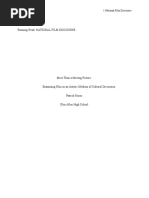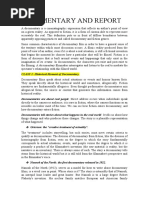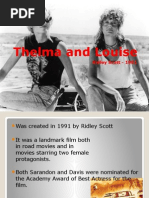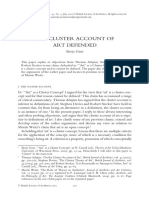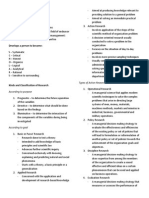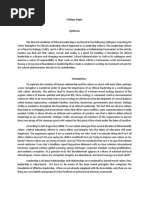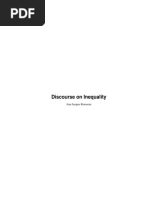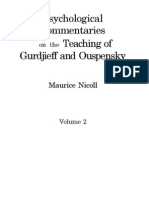3 4 Genre Theory
3 4 Genre Theory
Uploaded by
api-293260528Copyright:
Available Formats
3 4 Genre Theory
3 4 Genre Theory
Uploaded by
api-293260528Original Title
Copyright
Available Formats
Share this document
Did you find this document useful?
Is this content inappropriate?
Copyright:
Available Formats
3 4 Genre Theory
3 4 Genre Theory
Uploaded by
api-293260528Copyright:
Available Formats
3.
4 Genre Theory
To word genre comes from French (and origionally Latin) meaning
class or kind.
Looking at genre as a way of classifying texts began with the Greeks.
Aristotle and Plato looked at poetry (satire vs hyms) and drama.
Jacques Derrida (a French philosopher active in 1960s-1980s who
studied semiotics and deconstructing texts) and other academics in the
20th century helped progess these ideas and add nuances to them.
In short, current genre theory academics agree that a genre is a way of
categorising a group of films that have similar characteristics (though
they dont have to have all the same characteristics and these may
change over time to reflect changes in society). So, within a genre
there are both great similarities, but also differences/variety.
1. Patterns defining a genre
Films (and other texts) can be categorised and analysed as genres. These are groups of
films that share characteristics (eg the femme fatale, the dark visual style). These
characteristics are not always unique to the genre (eg other films may have dark visual
styles, or a murderous woman), but the way they combine and home prominent they are
or how they function in the film can create the patterns of genre. Patterns/conventions
can include - repeated themes, settings (location and historical), type-cast actors, dialogue
patterns, characterisations, repeated plots/narratives.
Quotes from academics:
Abercrombie: 'Cognitive' satisfactions may be derived from problem-solving,
testing hypotheses, making inferences (e.g. about the motivations and goals of
characters) and making predictions about events.
In relation to television, Nicholas Abercrombie suggests that 'part of the
pleasure is knowing what the genre rules are, knowing that the programme has to
solve problems in the genre framework, and wondering how it is going to do so'
(Abercrombie 1996: 43). He adds that audiences derive pleasure from the way in
which their expectations are finally realized (ibid.).
2. Differences within the genre
Within genre there will still be differences (eg the femme fatale may be more sympathetic,
she may be able to murder herself rather than get the man to do it, she may be sent to jail
or killed at the end, the hard-boiled protagonist may be a detective or something else). If
there werent differences the audience would get bored of it as they would be too
predictable. Competent readers of a genre are not generally confused when some of their
initial expectations are not met - the framework of the genre can be seen as offering
'default' expectations which act as a starting point for interpretation rather than a
straitjacket. However, challenging too many conventional expectations for the genre could
threaten the integrity of the text. Familiarity with a genre enables readers to generate
feasible predictions about events in a narrative.
Quotes:
Steve Neale (1980) says that difference is absolutely essential to the
economy of the genre and genres are instances of repetition and difference (mere
repetition would not attract an audiece)
Tzvetan Todorov (1985) any instance of a genre will be necessarily different
Wittgenstein talked about family resemblances which many contemporary
theorists refer to (films dont need to be exactly the same, but need to resemble
each other to be in the same genre)
Fowler (1989) - An individual text within a genre rarely if ever has all the
characteristic features of the genre
Abercrombie - We may derive pleasure from observing how the conventions
of the genre are manipulated (Abercrombie 1996: 45). We may also enjoy the
stretching of a genre in new directions and the consequent shifting of our
expectations.
3. Genre changes in response to society
Genre is not constant across films or time. It responds to the needs (fears, desires) of the
audience as well as changes in technology. The conventions of genres shift, new genres
and sub-genres emerge and others are discontinued, like film noir (though certain genres
seem more long-lasting). The cycles and transofrmations of genres can be seen as a
response to political, social and economic conditions.
Quotes:
Nicholas Abercrombie the boundaries between genres are shifting and
becoming more permeable (this could relate to how pure film noir died out around
the late 50s but we have seen resurgences of neo noir usually combined with
something else eg The Matrix can be seen as sci-fi but also neo noir - a cross-
genre).
David Buckingham genre is not simple given by the culture: rather it is in a
constant process of negotiation and change
Tzvetan Todorov a new genre is always the transformation of one or several
old genres (eg film noir was born from crime films being crossed with pulp fiction
novels)
Andrew Tudor (1974) 'a genre... defines a moral and social world'
Susan Hayward genre conventions change according to the ideological
climate of the time
4. Some genres are only defined retrospectively
This is the case for film noir. It wasnt until film critic Nino Frank (French) saw a bunch of
post WWII films all at once (much of Europe wasnt able to get these during the war) that
he coined the term film noir. Some critics still debate whether film noir is a true genre,
or more of a visual style tor mood that can be applied to any genre (eg you could have a
sci fi with a noir look/mood).
5. The use of Genre can be profitable for production companies
Once a genre is seen as profitable/popular it makes sense of TV or film companies to
continue churning out the same types of products. They can use the same
actors/writers/directors and it creates a kind of economy of scale. There is a loyal
audience for the product and they can be identified and catered to. In mass media it is
useful to be able to target different audience segments this way.
Quotes
Abercrombie: Economic factors may account for the perpetuation of a
profitable genre. Nicholas Abercrombie notes that 'television producers set
out to exploit genre conventions... It... makes sound economic sense. Sets,
properties and costumes can be used over and over again. Teams of stars,
writers, directors and technicians can be built up, giving economies of scale'
.'genres permit the creation and maintenance of a loyal audience which
becomes used to seeing programmes within a genre'
Christine Gledhill (1985) 'differences between genres meant different
audiences could be identified and catered to... This made it easier to
standardise and stabilise production'
6. There is some snobbery around the use of genre
Some film critics use it as almost an insult to say thats just a genre film (ie forumulaic)
and see them as just commercial products of pop culture rather than high art. A lot of
them prefer looking at films through the lens of auteur theory where films are seen as
products of the director, rather than products of genre. A director with a recognisable style
is seen as more worthy than someone who makes typical genre films.
1. Repetition 2. Variation 3. Changes to reflect society
What familiar patterns do we see with How does the role of the antihero What previous genres were similar to
the antihero or themes? vary? DSF?
What different things are the different What big events in society did DSF
Antiheroes trying to escape or reflect?
overcome?
How are the antiheroes different in Why did DSF change significantly
some ways? post 9/11?
You might also like
- Rethinking Genre Christine GledhillDocument24 pagesRethinking Genre Christine GledhillPaula_LobNo ratings yet
- The Essay Film From Montaigne After MarkerDocument244 pagesThe Essay Film From Montaigne After Markeryu100% (1)
- Jack Shadoian - Dreams and Dead Ends - The American Gangster Film PDFDocument396 pagesJack Shadoian - Dreams and Dead Ends - The American Gangster Film PDFmacaronmaniac100% (1)
- Diegetic Breaks in AvantguardeDocument41 pagesDiegetic Breaks in AvantguardeAleksandra SekulicNo ratings yet
- Bill Nichols 6 Modes DocumentaryDocument21 pagesBill Nichols 6 Modes DocumentaryAhmad Nawaz100% (1)
- Gran Torino Booklet 1Document12 pagesGran Torino Booklet 1api-293260528100% (1)
- Surrealism and The Occult - Tessel M. Bauduin PDFDocument31 pagesSurrealism and The Occult - Tessel M. Bauduin PDFMartín Mora Piñeiro0% (2)
- Film Genre Power PointDocument18 pagesFilm Genre Power PointScott WeissNo ratings yet
- L6 Genre Theory - QuotesDocument20 pagesL6 Genre Theory - QuotesJane KnightNo ratings yet
- A2 Section A Genre and Media TheoriesDocument22 pagesA2 Section A Genre and Media TheoriesAdPamulaNo ratings yet
- An Introduction To Genre TheoryDocument15 pagesAn Introduction To Genre TheoryPervin AvciNo ratings yet
- An Introduction To Genre TheoryDocument18 pagesAn Introduction To Genre TheoryklamasNo ratings yet
- Genre SNSMDocument17 pagesGenre SNSMDee WatsonNo ratings yet
- Cross Cultural Film Guide Aufderheide PDFDocument50 pagesCross Cultural Film Guide Aufderheide PDFren worbNo ratings yet
- Research ProposalDocument9 pagesResearch Proposalapi-508136603No ratings yet
- NarrativeDocument5 pagesNarrativeRangarajan SrinivasaNo ratings yet
- Horror PDFDocument14 pagesHorror PDFRajini KumarNo ratings yet
- Genre Explained: Why Is It Important?Document14 pagesGenre Explained: Why Is It Important?Mummy Media100% (2)
- Session 2 - GenreDocument25 pagesSession 2 - GenreElie-pierre BassilNo ratings yet
- Contempory Cinema Essay 1Document3 pagesContempory Cinema Essay 1duckie7777No ratings yet
- Research The Usefulness of Genre As A Critical Tool For Understanding How Meaning Is Created in A Cinematic MediumDocument4 pagesResearch The Usefulness of Genre As A Critical Tool For Understanding How Meaning Is Created in A Cinematic Mediumapi-299379786No ratings yet
- Deborah Shaw - Deconstructing and Reconstructing Transnational CinemaDocument20 pagesDeborah Shaw - Deconstructing and Reconstructing Transnational CinemamarcelabrNo ratings yet
- Chapter 3: The Documentary Genre. Approach and TypesDocument18 pagesChapter 3: The Documentary Genre. Approach and TypesEirini PyrpyliNo ratings yet
- Genre TheoryDocument3 pagesGenre TheoryEllie BuchanNo ratings yet
- Tarantino EffectDocument39 pagesTarantino EffectresevoirdNo ratings yet
- Film Intro Class GenreDocument35 pagesFilm Intro Class GenreKyo learnNo ratings yet
- Lec5 ..Document7 pagesLec5 ..Mahak SwamiNo ratings yet
- To Understand How Genres Function To Identify Genre Codes and Conventions To Discuss Positives and Negative of Genre Branding-CompressedDocument22 pagesTo Understand How Genres Function To Identify Genre Codes and Conventions To Discuss Positives and Negative of Genre Branding-Compressedapi-394443105100% (1)
- Film Genre: Film Theory / Ʒɒnrə/ Narrative ElementsDocument11 pagesFilm Genre: Film Theory / Ʒɒnrə/ Narrative ElementsAlanaStephenson101100% (1)
- Film Genre: Film Theory / Ʒɒnrə/ Narrative ElementsDocument11 pagesFilm Genre: Film Theory / Ʒɒnrə/ Narrative ElementsAlanaStephenson101No ratings yet
- The Film Essays Writing With The Movie CameraDocument5 pagesThe Film Essays Writing With The Movie CameraŞtefan-Adrian RusuNo ratings yet
- G235: Critical Perspectives in Media: Theoretical Evaluation of Production 1b) RepresentationDocument35 pagesG235: Critical Perspectives in Media: Theoretical Evaluation of Production 1b) Representationapi-25890286No ratings yet
- Hybrid or Inbred: The Purity Hypothesis and Hollywood Genre HistoryDocument16 pagesHybrid or Inbred: The Purity Hypothesis and Hollywood Genre HistoryMonique AguiarNo ratings yet
- Running Head: National Film DiscourseDocument14 pagesRunning Head: National Film Discourseapi-348916138No ratings yet
- FM2 Booklet Part 1Document34 pagesFM2 Booklet Part 1belair1981No ratings yet
- Historical Film - Stubbs (Sample) - LibreDocument30 pagesHistorical Film - Stubbs (Sample) - LibreAimeeNo ratings yet
- Understanding Genre: An Approach To Popular FilmDocument34 pagesUnderstanding Genre: An Approach To Popular Filmsmitr004No ratings yet
- Film GenresDocument7 pagesFilm GenresPinkyFarooqiBarfi100% (1)
- Documentary and ReportDocument8 pagesDocumentary and ReportAna MartínezNo ratings yet
- Genre Theory 1Document16 pagesGenre Theory 1ama.lembetheNo ratings yet
- The History of FilmDocument5 pagesThe History of FilmMia SamNo ratings yet
- Chandler Genre TheoryDocument15 pagesChandler Genre TheorySan MartinNo ratings yet
- Postmodern Ethics in Cinema: Ethics of Contemporary Fairy Tale Adaptations in HollywoodDocument15 pagesPostmodern Ethics in Cinema: Ethics of Contemporary Fairy Tale Adaptations in Hollywoodmesut bostanNo ratings yet
- Nataly Macas WRITING #2 - UNIT2 LEVEL 3Document4 pagesNataly Macas WRITING #2 - UNIT2 LEVEL 3Nataly MacasNo ratings yet
- Dramh Finalpaper JoseduranDocument18 pagesDramh Finalpaper Joseduranapi-596629634No ratings yet
- Media and CommunicationDocument16 pagesMedia and Communicationaag0033398No ratings yet
- Staiger - Hybrid or Inbred The Purity Hypothesis and Hollywood Genre HistoryDocument17 pagesStaiger - Hybrid or Inbred The Purity Hypothesis and Hollywood Genre HistorySepsi László0% (1)
- Film Producer As A Criative ForceDocument23 pagesFilm Producer As A Criative ForceHugo Damasceno100% (1)
- 6 Types of Documentary (FREE)Document4 pages6 Types of Documentary (FREE)Mohamad Ad0% (1)
- History Film TestDocument7 pagesHistory Film TestBryan LazaroNo ratings yet
- An Introduction To Genre Theory: January 1997Document16 pagesAn Introduction To Genre Theory: January 1997pratolectusNo ratings yet
- Assignment 1 1500 WordsDocument3 pagesAssignment 1 1500 WordsdavenportlucaNo ratings yet
- The Orientalist Gaze of Western Film Reviews On Internationally Acclaimed Filipino Indie FilmsDocument35 pagesThe Orientalist Gaze of Western Film Reviews On Internationally Acclaimed Filipino Indie FilmsKris AngelNo ratings yet
- Defining Documentary FilmDocument13 pagesDefining Documentary FilmAshimaNo ratings yet
- Narration 2 - Narration and FocalizationDocument4 pagesNarration 2 - Narration and FocalizationMick KolesidisNo ratings yet
- Oral Bac LLCEDocument1 pageOral Bac LLCEamir.bouchelaghem.abNo ratings yet
- Week 19 Auteur TheoryDocument42 pagesWeek 19 Auteur TheoryLuccas Santos VianaNo ratings yet
- Me and My MoviesDocument7 pagesMe and My Moviesapi-264459464No ratings yet
- 2012 Mid Year 2 3 Unfamiliar - Answer BookletDocument9 pages2012 Mid Year 2 3 Unfamiliar - Answer Bookletapi-293260528No ratings yet
- Analyse Unfamiliar Text Practice QuestionsDocument20 pagesAnalyse Unfamiliar Text Practice Questionsapi-293260528No ratings yet
- Opening Scenes GTDocument3 pagesOpening Scenes GTapi-293260528No ratings yet
- Walt Kowalski - CharacterDocument8 pagesWalt Kowalski - Characterapi-293260528No ratings yet
- 2012 Level 2 Unfamiliar ExamDocument5 pages2012 Level 2 Unfamiliar Examapi-293260528No ratings yet
- Dulce Et Decorum Est - Language Features QuizDocument12 pagesDulce Et Decorum Est - Language Features Quizapi-293260528No ratings yet
- Dulce RevisionDocument3 pagesDulce Revisionapi-293260528No ratings yet
- Writing and Essay Powerpoint UpdatedDocument12 pagesWriting and Essay Powerpoint Updatedapi-293260528No ratings yet
- Walt Kowalski - CharacterDocument8 pagesWalt Kowalski - Characterapi-293260528No ratings yet
- Whos For The Game - PowerpointDocument9 pagesWhos For The Game - Powerpointapi-293260528100% (1)
- Gran Torino - ThemesDocument14 pagesGran Torino - Themesapi-29326052860% (5)
- Final Scene AnalysisDocument3 pagesFinal Scene Analysisapi-293260528No ratings yet
- Wilfre OwenDocument21 pagesWilfre Owenapi-293260528No ratings yet
- Gran TorinoDocument17 pagesGran Torinoapi-293260528No ratings yet
- Dulce Et Decorum Est - PoemDocument2 pagesDulce Et Decorum Est - Poemapi-293260528No ratings yet
- The Walls of JerichoDocument6 pagesThe Walls of Jerichoapi-293260528No ratings yet
- FTV Guide To 3 2Document9 pagesFTV Guide To 3 2api-293260528No ratings yet
- Thelma and LouiseDocument8 pagesThelma and Louiseapi-293260528No ratings yet
- Bonnie and ClydeDocument7 pagesBonnie and Clydeapi-293260528No ratings yet
- An Apology For Poetry by Sir Philip SydnDocument3 pagesAn Apology For Poetry by Sir Philip SydnShweta kashyapNo ratings yet
- Introduction To SociologyDocument28 pagesIntroduction To SociologyFor Amazon50% (2)
- Jean Baudrillard: Encyclopaedia Universalis, Vol. 12 424-426Document10 pagesJean Baudrillard: Encyclopaedia Universalis, Vol. 12 424-426Jorge de La BarreNo ratings yet
- THE CLUSTER ACCOUNT OF ART DEFENDED Berys GautDocument16 pagesTHE CLUSTER ACCOUNT OF ART DEFENDED Berys Gautfuckyeah111100% (1)
- Research NotesDocument3 pagesResearch NotesJohn Kenneth ElfaNo ratings yet
- Feminist Theory Begin !!: Lesson 6Document5 pagesFeminist Theory Begin !!: Lesson 6JanineNo ratings yet
- Livro. Concepts of Force, Max Jammer PDFDocument141 pagesLivro. Concepts of Force, Max Jammer PDFHalwaro Freire0% (1)
- Comment Faire Une Dissertation de Philosophie en STMGDocument4 pagesComment Faire Une Dissertation de Philosophie en STMGPayToWriteAPaperAnchorage100% (1)
- Philosophy of Being HumanDocument1 pagePhilosophy of Being HumanSweet DispositionNo ratings yet
- Theistic Ethics and The Euthyphro Dilemma: Richard JoyceDocument27 pagesTheistic Ethics and The Euthyphro Dilemma: Richard Joycemaqw123No ratings yet
- 03.10. Cesare Brandi. Theory of Restoration PDFDocument2 pages03.10. Cesare Brandi. Theory of Restoration PDFDimitri RobinNo ratings yet
- Critique PaperDocument3 pagesCritique PaperIris Parcon BerangberangNo ratings yet
- Golovkova Cornellgrad 0058F 10538Document196 pagesGolovkova Cornellgrad 0058F 10538Tanu shreeNo ratings yet
- Literary Theory & Literary Lenses HandoutsDocument3 pagesLiterary Theory & Literary Lenses HandoutsannastaplesNo ratings yet
- PC Syllabus For Canvas Ver 2Document9 pagesPC Syllabus For Canvas Ver 2Aine CebedoNo ratings yet
- Show How Wordsworth Glorifies Childhood in Ode On Intimations of Immortality MainDocument2 pagesShow How Wordsworth Glorifies Childhood in Ode On Intimations of Immortality MainMd NaSirNo ratings yet
- Barthes SemiologyDocument11 pagesBarthes Semiologysomsi yadavNo ratings yet
- The Ecology and Semiotics of Language LearningDocument260 pagesThe Ecology and Semiotics of Language LearningWilson GomesNo ratings yet
- Discourse On Inequality: Jean Jacques RousseauDocument44 pagesDiscourse On Inequality: Jean Jacques RousseauGonjack ImamNo ratings yet
- Nicoll, Maurice - Psychological Commentaries On The Teaching of Gurdjieff and Ouspensky Volume 2Document409 pagesNicoll, Maurice - Psychological Commentaries On The Teaching of Gurdjieff and Ouspensky Volume 2lazystreetfreak100% (6)
- Chapter 1.1a Basics of Measur & InstruDocument27 pagesChapter 1.1a Basics of Measur & Instrukibrom atsbhaNo ratings yet
- Revival and Reform in IslamDocument117 pagesRevival and Reform in IslamDynamic Sunni Orthodoxy100% (1)
- Colonizing and Decolonizing MindsDocument14 pagesColonizing and Decolonizing MindsAli S. Harfouch0% (1)
- 4 6008290936478501319Document3 pages4 6008290936478501319DanielNo ratings yet
- The Evolution of Principia Mathematica Bertrand Russells Manuscripts and Notes For The Second Edition (Bernard Linsky)Document420 pagesThe Evolution of Principia Mathematica Bertrand Russells Manuscripts and Notes For The Second Edition (Bernard Linsky)Zaqueu Ferreira da Silva100% (2)
- How To Empower YourselfDocument7 pagesHow To Empower Yourselfapi-6130137No ratings yet
- Racsmany Roediger Butler 2010 The Critical Role of Retrieval Practice in Long Term RetentionDocument8 pagesRacsmany Roediger Butler 2010 The Critical Role of Retrieval Practice in Long Term Retentioneva.mmNo ratings yet
- KPA God in The Doorway 1012Document4 pagesKPA God in The Doorway 1012Victoria LitmanNo ratings yet
- Concept Explication AssignmentDocument5 pagesConcept Explication AssignmentLashantha JayakodyNo ratings yet





